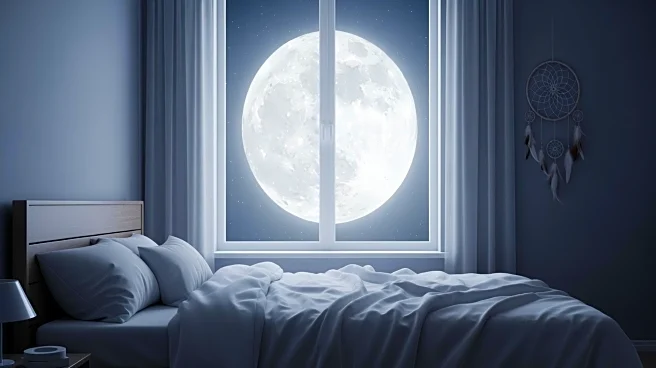What's Happening?
A neurologist specializing in sleep medicine has examined the longstanding belief that the full moon affects sleep and mental health. Historically, the full moon has been associated with sleepless nights and erratic behavior, a notion supported by anecdotal
evidence from police officers and hospital staff. Scientific studies indicate that the full moon can modestly impact sleep patterns, with people sleeping less and experiencing reduced deep sleep during this lunar phase. The primary factor is the increased brightness of the moonlight, which can delay the body's internal clock and reduce melatonin levels. While the sleep loss is generally minor, it can be more pronounced in areas without artificial light. The connection between the full moon and mental health issues, such as bipolar disorder and schizophrenia, is less clear, with research showing weak evidence of lunar phases triggering psychiatric crises.
Why It's Important?
Understanding the full moon's impact on sleep is crucial as sleep loss is a significant driver of mental health problems. Even minor sleep disruptions can exacerbate conditions like depression and bipolar disorder, particularly in vulnerable individuals. The findings highlight the importance of managing light exposure at night, which can affect circadian rhythms and overall sleep quality. This research underscores the broader implications of light pollution and its potential effects on public health, advocating for awareness and strategies to mitigate artificial light exposure.
What's Next?
Further research may explore the nuanced effects of lunar phases on sleep and mental health, considering cultural and environmental factors. Sleep experts might continue to advocate for policies that align with natural light cycles, such as permanent standard time, to improve sleep health. Public health initiatives could focus on educating individuals about the impact of light exposure on sleep and mental well-being, promoting practices that minimize artificial light interference.
Beyond the Headlines
The persistence of the full moon myth may be attributed to psychological phenomena like illusory correlation, where people remember unusual events coinciding with a full moon but overlook uneventful nights. This highlights the need for critical examination of folklore and its influence on perceptions of natural phenomena. The study also emphasizes the broader impact of light on human behavior, suggesting that modern artificial light sources have a more significant effect on sleep than the moon.
















